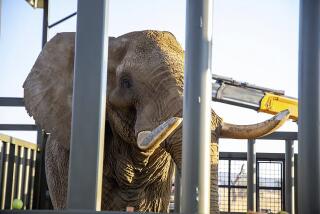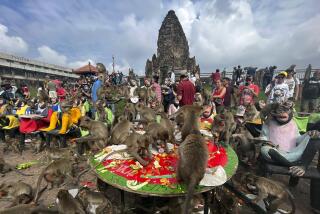Elephants Find Greener Pastures in Busy Bangkok
- Share via
BANGKOK, Thailand — Hard-pressed to make a living in Thailand’s dwindling jungles, a group of elephant handlers has found greener pastures for 50 of its animals in the bustling streets of Bangkok.
The four-ton beasts lumber calmly along the congested roads, towering above cars and stopping to accept food from passers-by, perform tricks or pose for photographs.
The elephants were trucked to Bangkok from northeast Thailand earlier this year for a government tourist promotion program.
They stayed on when their owners realized that they could earn more money in the capital--giving children rides or playing soccer for audiences--than they could back home.
Vichai Plaisuwan, an elephant handler, or mahout, from Surin province, said his job there had disappeared with the jungle.
“Many years ago, when Surin was still covered in forests, elephants were used to drag timber to the mills. But now all the trees have been cut down,” he said.
Good-Luck Charm
Thais pay 45 cents to walk under his elephant’s belly, which, according to tradition, brings good luck.
Customers include pregnant women anxious for healthy babies, students who want better marks and traders who want to get rich quick.
Vichai, who comes from a long line of mahouts, said he also makes money selling carved ivory objects.
The city elephants’ lowly status is a far cry from the dignified position they have long enjoyed in Thailand.
“Elephants are considered sacred and have always held an important place in Thai culture,” wildlife specialist Amnuay Korvanich said.
“A hundred years ago, they carried kings into battle; were prized possessions of the aristocracy. A person’s rank was judged by the number of elephants in his household.”
Even nowadays, no state procession or big religious ceremony is complete without the imposing presence of elephants.
More to Read
Sign up for Essential California
The most important California stories and recommendations in your inbox every morning.
You may occasionally receive promotional content from the Los Angeles Times.










